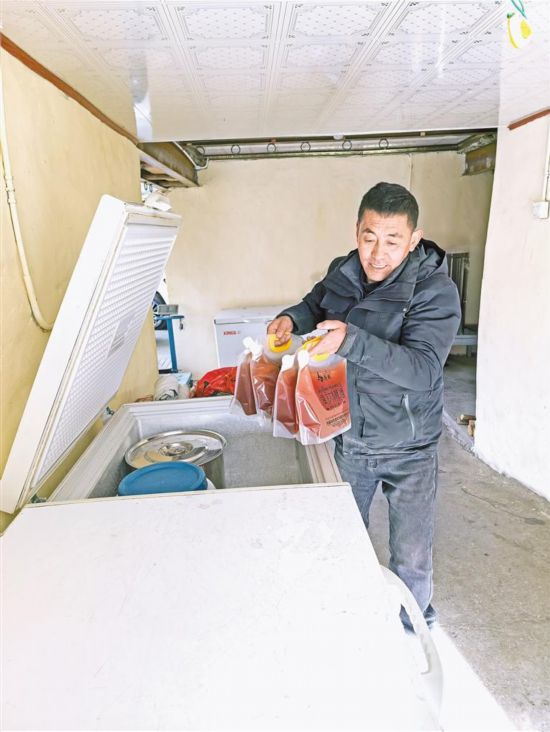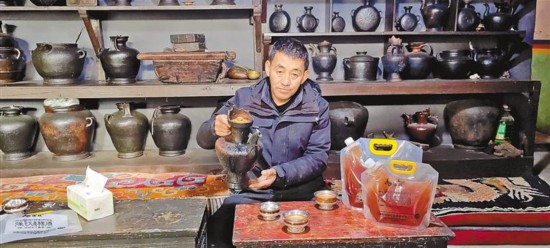
Lobsang Dorje takes highland barley wine from the refrigerator at his workshop in Qangkyim village, Layu township, Qonggyai county, Shannan city, southwest China's Xizang Autonomous Region. (Photo/Tibet Daily)
"My highland barley wine sells very fast," said Lobsang Dorje, an inheritor of Qiangqin highland barley wine in Qangkyim village, Layu township, Qonggyai county, Shannan city, southwest China's Xizang Autonomous Region.
The artisanal brewer said his product has become so popular that it's unavailable during Tibetan New Year without advance orders. Distributors from Lhasa, Tsethang in Shannan and surrounding areas have already reserved 1,400 bags of highland barley wine for next year, each weighing 2.5 kilograms.
Lobsang Dorje's mostly handcrafted wine attracts buyers from Lhasa, Shannan, Shigatse and Nyingchi, with distributors regularly traveling to his workshop to collect orders throughout the year.
The popularity of Lobsang Dorje's wine stems from its exceptional quality.

Lobsang Dorje tastes highland barley wine at his workshop in Qangkyim village, Layu township, Qonggyai county, Shannan city, southwest China's Xizang Autonomous Region. (Photo/Tibet Daily)
Qangkyim village is renowned for its premium highland barley, which is used to craft Qiangqin highland barley wine. The plump, glossy grains are cleaned, simmered, drained and mixed with distiller's yeast before being sealed in earthen jars for fermentation. The result is a fragrant, silky wine with a smooth finish and lingering aftertaste.
Lobsang Dorje initially learned the brewing art from his wife. After a year of research, he improved the wine's flavor. To maintain quality, he avoids extending the product's shelf life.
"Highland barley wine doesn't cause bloating, yet despite its modest 7-8 percent alcohol content, it packs a punch," said Palbar, a resident of Lhasa. He added that the wine is a favorite at festivals and picnics.
Today, most villagers in Qangkyim are skilled winemakers. Lobsang Dorje's workshop provides jobs for six local people each year who help with barley cooking and wine brewing.
"They're paid hourly, and each worker can earn an average of 24,000 yuan ($3,302) annually," Lobsang Dorje explained. The workshop's annual profit is around 500,000 yuan.
The "Qiangqin" trademark was registered in 2016. The authorities recognized the traditional brewing technique as a municipal-level intangible cultural heritage in Shannan in 2020, before elevating it to region-level protected status in Xizang last year.
